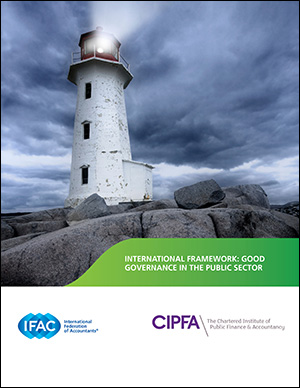Both in the public and private sector, auditors care about the governance arrangements of their auditees. In the public sector, where recommendations are a key audit output, I would argue that we frame our advice on the assumption that our client is rational, public-spirited and focused on achieving its objectives. This is how the IFAC/CIPFA International Framework, Good Governance in the Public Sector, defines the objective of good governance. So when the European Court of Auditors sought to assess the governance arrangements of the European Commission, the International Framework was the obvious tool to use.
Our conclusion and recommendations, plus insight into our approach, is covered in the 2016 Special report, Governance at the European Commission—Best Practice? The process also gave me a chance to develop five lessons from working with the Framework, and a couple of wishes, that generated an interesting discussion at the CIPFA Annual Conference 2017 in July.
The International Framework Is Consistent with Other Major Frameworks
As IFAC and CIPFA told the world, the International Framework was developed after reviewing current literature. During our process, we checked whether it the Framework is consistent with other key sources of guidance on the issues we covered—if not, we expected our recommendations would be challenged. The Framework passed with flying colors.
The Role of the Audit Committee Is Central
Having an audit committee with an independent membership and a wide-ranging mandate is essential. We reviewed the arrangements of a number of international public sector bodies to see what can be achieved. There are some great examples of good practice out there.
Getting the Structures Right Is Essential, But You Need People to Make the Structures Work
We had a lively discussion on this at CIPFA’s conference. Two major thoughts emerged: To make the internal and external accountability mechanism work, you need people who are prepared to ask tough questions—sometimes more than once. Ensuring all the right questions are asked is also crucial, and having a diverse group of people involved is a big advantage.
External Reporting Feeds into Internal Accountability
Setting the target of explaining the difficult issues to an external audience should mean that you debate them internally too. Best practice is to give those tough members on the audit committee a chance to go through them. These days, reporting on non-financial issues often appears to be more of a challenge than reporting on finances.
Applying an External Suite of Financial Reporting Standards Ensures You Have the Financial Information to Support Internal Questions
The transformation of financial reporting by big international organizations should not be underestimated—and the European Commission is part of the group that has made a rapid advance. Applying a valid, independently-determined set of accruals standards (such as International Public Sector Accounting Standards) makes it harder to keep the bad news off the balance sheet. Now that is good for governance.
And Two Small Wishes
Putting together the International Framework was a tremendous achievement. I hope neither CIPFA nor IFAC will allow it to get become dated before reviewing the content. The guidance it contains is itself evolving, as is best practice in the public sector.
And when a review takes place, I hope that someone will take the material in the Supplement, which I believe is excellent, as the basis for drawing up a self-assessment guide. This would be a valuable quick win.

